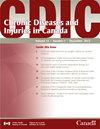An environmental scan of policies in support of chronic disease self-management in Canada.
引用次数: 14
Abstract
INTRODUCTION The evidence supporting chronic disease self-management warrants further attention. Our aim was to identify existing policies, strategies and frameworks that support self-management initiatives. METHODS This descriptive study was conducted as an environmental scan, consisting of an Internet search of government and other publicly available websites, and interviews with jurisdictional representatives identified through the Health Council of Canada and academic networking. RESULTS We interviewed 16 representatives from all provinces and territories in Canada and found 30 publicly available and relevant provincial and national documents. Most provinces and territories have policies that incorporate aspects of chronic disease self-management. Alberta and British Columbia have the most detailed policies. Both feature primary care prominently and are not disease specific. Both also have provincial level implementation of chronic disease self-management programming. Canada's northern territories all lacked specific policies supporting chronic disease self-management despite a significant burden of disease. CONCLUSION Engaging patients in self-management of their chronic diseases is important and effective. Although most provinces and territories have policies that incorporate aspects of chronic disease self-management, they were often embedded within other initiatives and/or policy documents framed around specific diseases or populations. This approach could limit the potential reach and effect of self-management.加拿大支持慢性病自我管理政策的环境扫描。
支持慢性疾病自我管理的证据值得进一步关注。我们的目标是确定现有的政策、战略和框架,以支持自我管理计划。方法:本描述性研究以环境扫描的方式进行,包括对政府和其他公共网站的互联网搜索,以及通过加拿大卫生委员会和学术网络确定的司法管辖区代表的访谈。结果我们采访了来自加拿大各省和地区的16名代表,并找到了30份公开可用的相关省和国家文件。大多数省和地区都有纳入慢性病自我管理各方面的政策。阿尔伯塔省和不列颠哥伦比亚省的政策最为详细。两者都突出了初级保健,而不是特定疾病。两国都有省级慢性病自我管理规划。加拿大北部地区都缺乏支持慢性病自我管理的具体政策,尽管疾病负担沉重。结论让患者参与慢性疾病的自我管理是重要而有效的。虽然大多数省和地区都有纳入慢性病自我管理各方面的政策,但这些政策往往被纳入围绕特定疾病或人群的其他举措和/或政策文件。这种做法可能限制自我管理的潜在范围和效果。
本文章由计算机程序翻译,如有差异,请以英文原文为准。
求助全文
约1分钟内获得全文
求助全文
来源期刊

Chronic Diseases and Injuries in Canada
PUBLIC, ENVIRONMENTAL & OCCUPATIONAL HEALTH-MEDICINE, GENERAL & INTERNAL
自引率
0.00%
发文量
0
审稿时长
>12 weeks
 求助内容:
求助内容: 应助结果提醒方式:
应助结果提醒方式:


